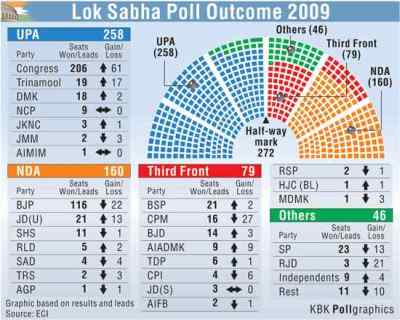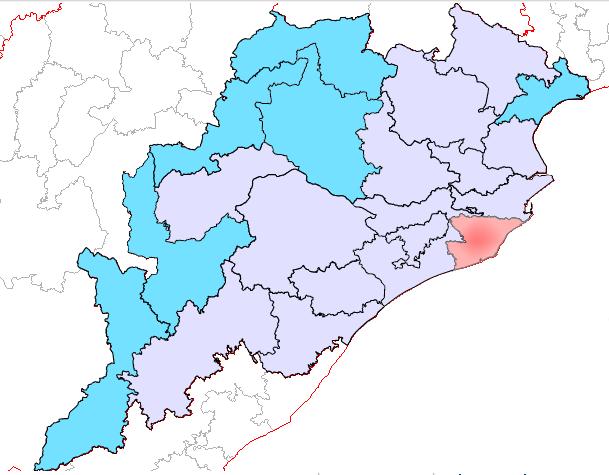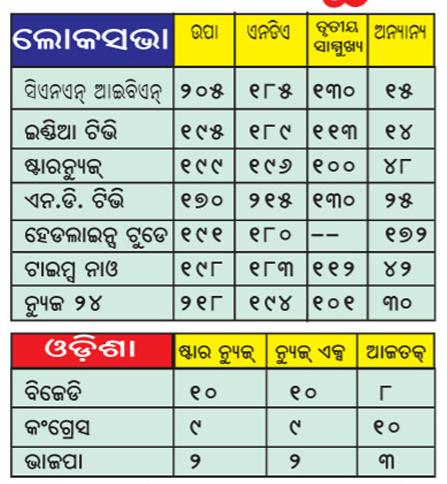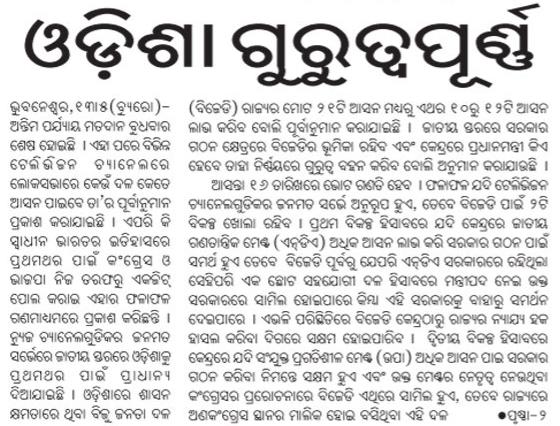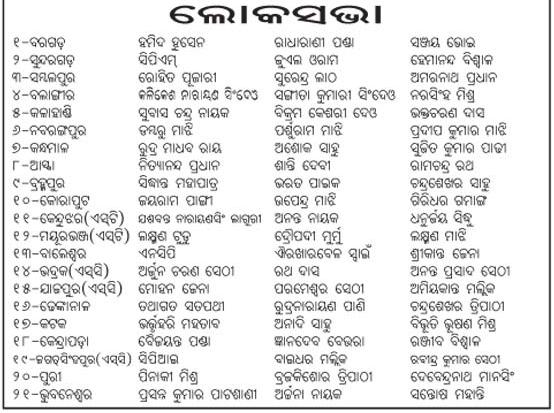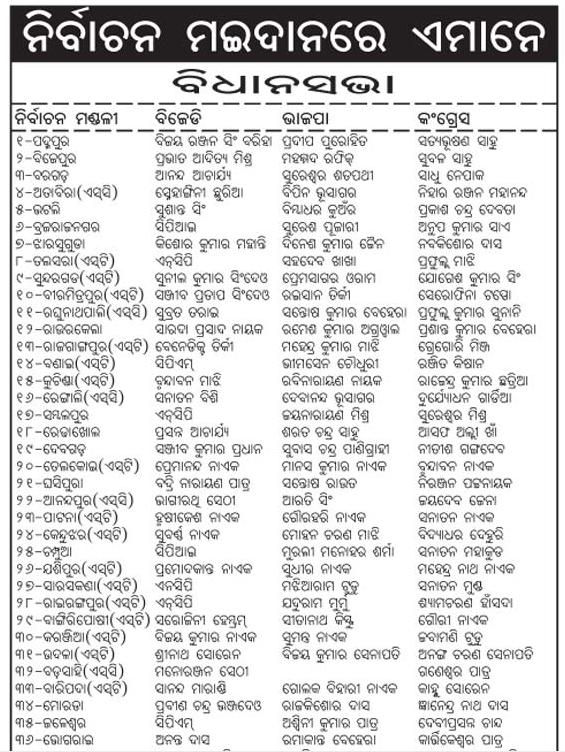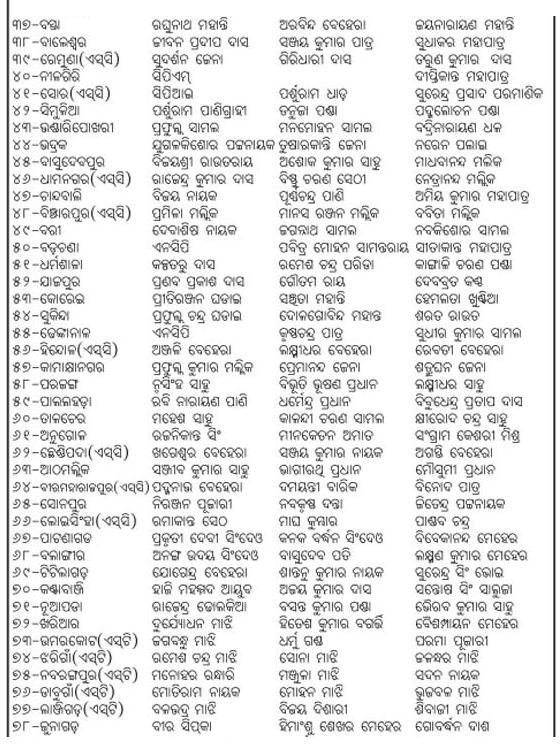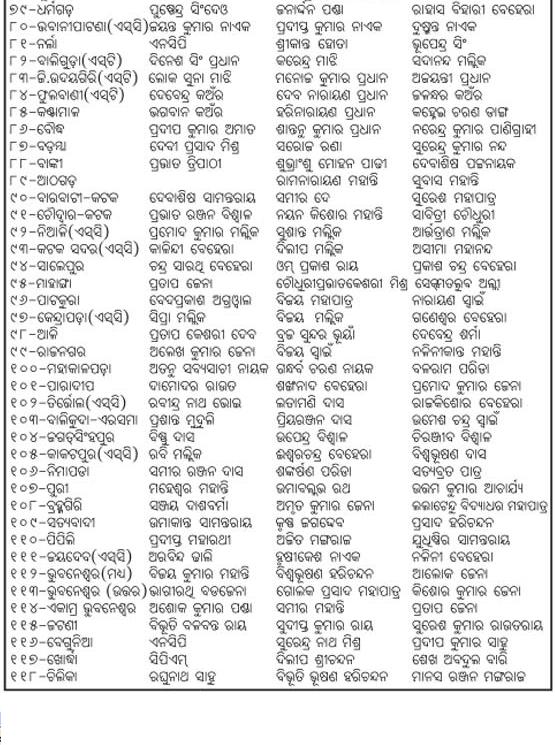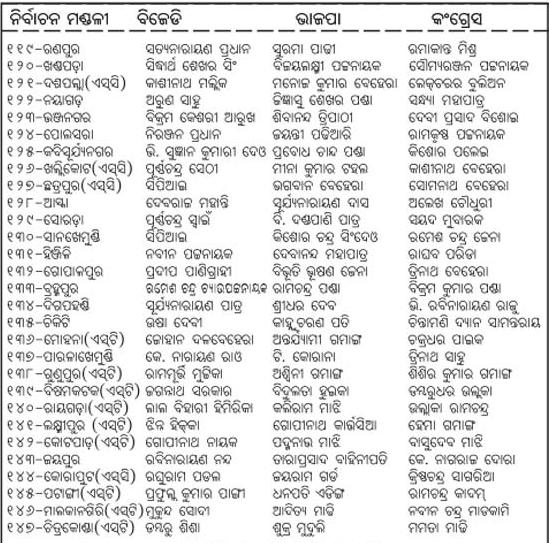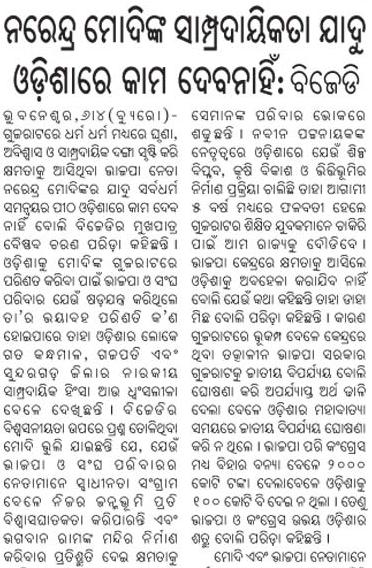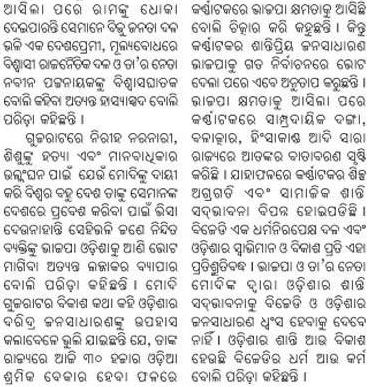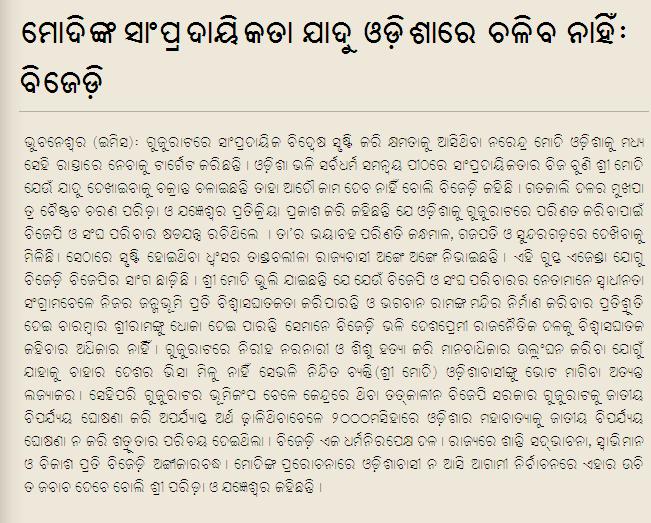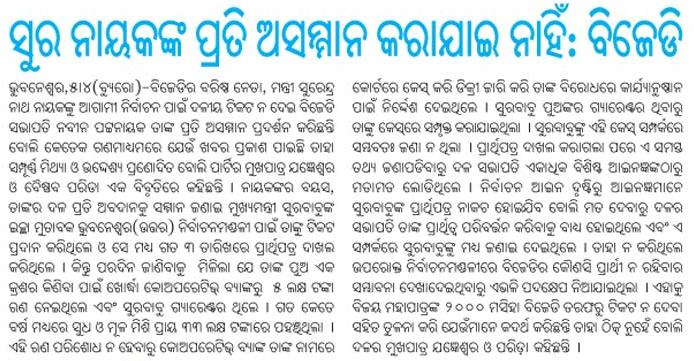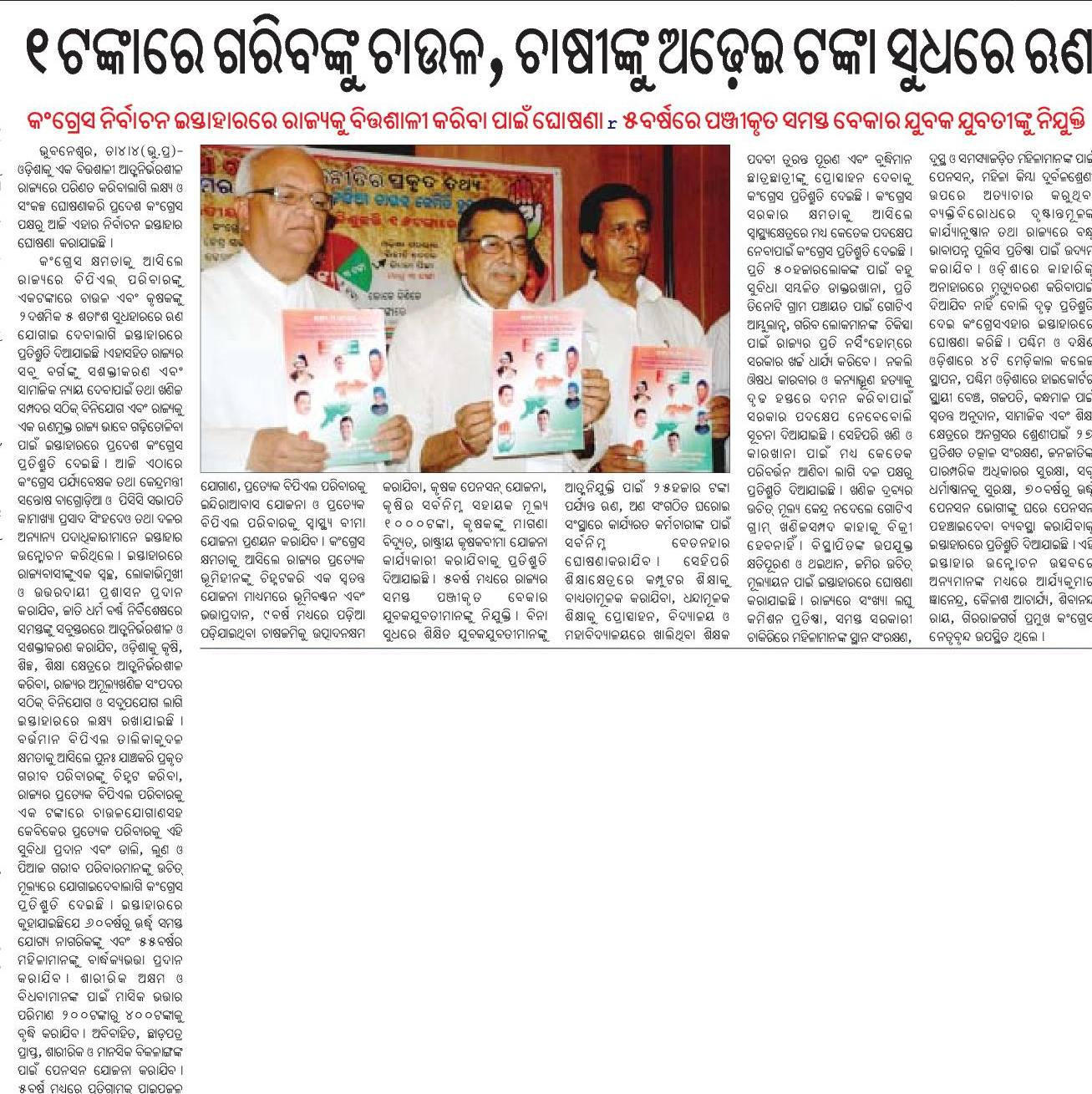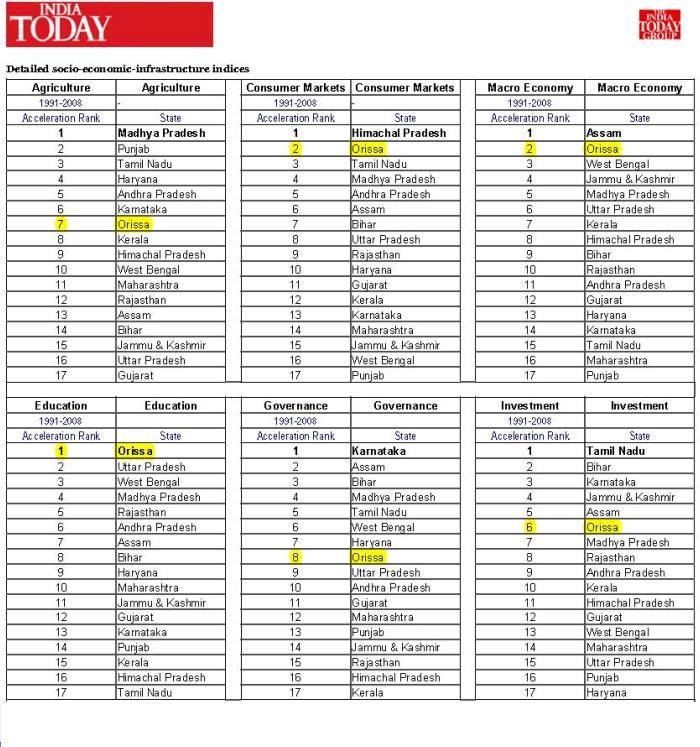Part 1 of Interview.
Part 2 of Interview.
Part 3 of Interview.
Part 4 of Interview.
Karan Thapar: Chief Minister, the polls are suggesting that you might be in a position to form a government on your own in Orissa after the elections. Half way through the voting with just one more round left, are you confident?
Naveen Patnaik: As a matter of fact, I am confident. I think with the blessings of the people of my state the Biju Janata Dal (BJD) is certainly coming through with a single majority. The party is having its own majority both to form a state government and to send a number of MPs to the Lok Sabha.
Karan Thapar: But on the question of the Lok Sabha, the problem is that the same polls are suggesting that you are going to end up with fewer seats than you had in 2004. Now can you accept that?
Naveen Patnaik: No, I don’t think so. It is possible because at that time we were fighting only 12 seats and out of them we got 11 and this time we are fighting 18 seats, I expect to do much-much better this time.
…
Naveen Patnaik: It was important to break up with the BJP because I don’t consider them healthy any longer for my state after Kandhamal – which I think is very apparent to everyone. Before Kandhamal, we were lucky in the early years of the state government not to have a serious communal problem at all. But Kandhamal was very tragic and serious.
Karan Thapar: So, you are saying that after Kandhamal you couldn’t have continued with the BJP in any circumstances?
Naveen Patnaik: It had become very, very difficult.
Karan Thapar: You hold the BJP and their associated allies responsible for what happened in Kandhamal?
Naveen Patnaik: When you interviewed me a few months ago about Kandhamal, I made it very clear that our administration had arrested a number of persons who belong to their sister organisations for the violence in Kandhamal.
Karan Thapar: I want very much to talk about your relationship with the BJP and why it ended in the way it did but first let us concentrate on the elections. If you don’t get an outright majority in the Vidhan Sabha, then you might look at the BJP for the extra seats that you need?
Naveen Patnaik: That will never happen; that we have already clarified.
Karan Thapar: In which case if you don’t get a majority on your own will you form a minority government or prefer to sit in the Opposition?
Naveen Patnaik: Well, I don’t doubt for a moment that my party will clear majority by itself.
Karan Thapar: That is your confidence but if you don’t then?
Naveen Patnaik: As a matter of fact, I haven’t thought about it at all.
Karan Thapar: So, you are ruling out the possibility of sitting in the Opposition?
Naveen Patnaik: In a democracy every party has to sit in the Opposition one time or the other.
Karan Thapar: So, even though you are denying it, you are mentally prepared for that possibility?
Naveen Patnaik: I don’t think that eventuality is a possibility in this election at all.
Karan Thapar: That the election will tell us in just four weeks time. Let’s come to the Centre. You have repeatedly said you will support a non-Congress and a non-BJP government, so does that mean that you are going to support the Third Front?
Naveen Patnaik: The BJD will not support a Congress-led government or a BJP-led government.
Karan Thapar: You have laid a lot of emphasis on the word ‘led’ so could you support a government in which the Congress and the BJP are a part but not in the leadership position?
Naveen Patnaik: Well, I see a situation which is very fluid at the moment as far as the Lok Sabha elections are concerned.
I perceive that the two national parties (the BJP and the Congress) shrinking even further in the numbers to what they have been in the recent past and there is a possibility of another force – call it a Third Front or a Fourth Front or any front – coming up.
And the interest of my party is to support a government which would fulfill the just demands of my state which have been neglected by the Central Government perpetually.
…
Karan Thapar: Let me approach it a bit differently. You have made it clear that there is no way you can support Manmohan Singh for another term as the Prime Minister of India but if it were to emerge that Sharad Pawar, with whom you have a seat-sharing arrangement in Orissa, could be a possible prime minister would the BJD support Sharad Pawar?
Naveen Patnaik: We can certainly look into that with a great level of possibility.
Karan Thapar: What does that mean?
Naveen Patnaik: It means what I have said. I assume or I think that there will be a government which will not be led by the Congress or the BJP.
Karan Thapar: But if it is led by Sharad Pawar, would you support it?
Naveen Patnaik: Let us put names aside. I have said it earlier and I repeat that the BJD’s interest is in supporting a government which will fulfill the just demand of my state. Orissa has been neglected for ages by the Central Government.
…
Karan Thapar: Let’s talk about the end of your 11-year alliance with the Bharatiya Janata Party. So far you have told the world that this alliance ended because the two parties couldn’t agree on certain seat-adjustments for the future. But beyond that, to what extent had you begun to feel suffocated by the BJP’s anti-minority ideology?
Naveen Patnaik: Well, as you know, a few months ago when Kandhamal took place, it was very disturbing and very worrying. It was horrifying what happened and ever since then the unease began between my party and the Bharatiya Janata Party.
It had been there earlier too because they hadn’t been the most honest of allies. In various elections they would try to undercut my party, but those are minor things in comparison to what happened in Kandhamal and its aftermath.
Karan Thapar: So Kandhamal in a sense was a breaking point for you.
Naveen Patnaik: Yes indeed, and their behaviour as allies within the Assembly and outside it was incorrect in many ways.
Karan Thapar: When Kandhamal happened, the urban-middle classes began to compare you with Narendra Modi. Some people even called you a second Narendra Modi. Did that upset, even hurt you?
Naveen Patnaik: I would never personally consider myself anything like that. I think in a secular manner, I have a secular background, so I never consider that as a correct allegation.
Karan Thapar: Which means that the comparison with Narendra Modi must have been deeply hurtful.
Naveen Patnaik: I found it just unbelievable, that is all.
Karan Thapar: When I interviewed you just after what happened in Kandhamal, you said to me that every single bone in your body was secular. Would you say today that the break with BJP proves that to be the case?
Naveen Patnaik: What would you say Karan? You have known me all my life.
Karan Thapar: I would say that is the case.
Naveen Patnaik: Thank you.
Karan Thapar: Was it done with that in mind?
Naveen Patnaik: One always stands by one’s beliefs in the end, don’t you think? Or one should stand by one’s beliefs.
Karan Thapar: Many would say that it took Naveen Patnaik nine years to stand up to his belief. Those who know you have always known that you were secular, that you were liberal and that you were modern.
They were astounded to know that you actually had an alliance with the BJP and that it lasted for so long. Why did it take you so long to stand up for your beliefs?
Naveen Patnaik: You’ll have seen that for the last dozen years, the BJP has a number of secular allies. You can think of Mamata Banerjee, Hegde, Farooq Abdullah, George Fernandes or even Nitish Kumar – they have a number of secular allies.
And in Orissa, we were fortunate enough that during the first eight years of my tenure there were no serious communal incidents. It’s not till Kandhamal happened that the whole picture changed.
Karan Thapar: People say that the whole problem you had over seat adjustments was in fact deliberately manufactured by you as a way of ensuring that the alliance would end and this is proven by the fact that when you made them an offer which you could live it, it was–even as you described it in your own words–a deliberately humiliating offer because you knew they would not accept it.
Naveen Patnaik: I have never called it in my own words, ‘a deliberately humiliating offer’.
Karan Thapar: (BJP MP) Chandan Mitra said you did.
Naveen Patnaik: Well then I don’t know what he is talking about.
Karan Thapar: But did you deliberately offer a derisory number of seats so as to force the alliance apart?
Naveen Patnaik: No, I think my offer was pretty realistic for they really could not afford to stand for more than a few seats because their whole period in the state government marked quite a lot of incompetence.
The people of Orissa are a peace-loving people and I think that they had gone off the BJP after Kandhamal, and you will see that after the results in the coming election, the results that come out on May 16.
…
Had you been in touch with the Left parties and the NCP and had they given you some understanding or assurance that if you did break with the BJP, they would be there to stand behind and beside you?
Naveen Patnaik: Well Karan, you may look at the other side of the picture. They could have found me rather than me finding them, the new seat-adjustment partner parties.
…
Karan Thapar: Absolutely. But let me get back to this more serious point. Had you been in touch, had you sent out feelers to the NCP and the Left?
Naveen Patnaik: In politics of course, as you know, one meets friends from all parties and we all air our points of view. We moved very swiftly once the alliance broke down. Our new friends very quickly offered their support for which I am very grateful.
Karan Thapar: If I read you correctly, then you had been in touch with them – perhaps quietly, perhaps surreptitiously – but you had a sense of assurance that they would be there.
Naveen Patnaik: Nothing surreptitious about it at all. It’s all quite clear.
Karan Thapar: Done quite openly?
Naveen Patnaik: I think Karan sometimes you will see things in black and white. Things are sometimes a bit more subtle than that.
…
Naveen Patnaik: I don’t think it is as simple as that. It is a straight, clear-cut seat-adjustment with three parties – the CPI, the CPM and the NCP.
…
Karan Thapar: If you win, will this be your last term as Chief Minister or having finished then 14 years in office would you want a fourth term?
Naveen Patnaik: Let’s see how it goes.
Karan Thapar: You mean you could be hungry for more?
Naveen Patnaik: I think that as long as – and you may think this is a very hackneyed or cliché way of speaking – but as long as one is interested and can do good and the people wish to elect you, then there is no harm in that at all.
This was a tricky interview and Naveen Patnaik and BJD may get a bit cornered by one answer of this interview. By saying out clearly and loudly that BJD will not support either Congress led or BJP led governments, it limits their post-election options, especially since Naveen Patnaik often stands by his words. On the face of it this may seem damaging to Orissa’s cause if BJP or Congress do lead but either coalition will be fragile enough that they will not be able to ignore what a BJD led government in Orissa will demand. (On the other hand if Naveen Patnaik had given an answer that he will be willing to consider joining a Congress led government after elections then BJP would have taken advantage of it and called BJD as Congress-B. Having broken the alliance with BJP he could not have said that he will consider joining a BJP led government. So he basically did not have a choice.)
